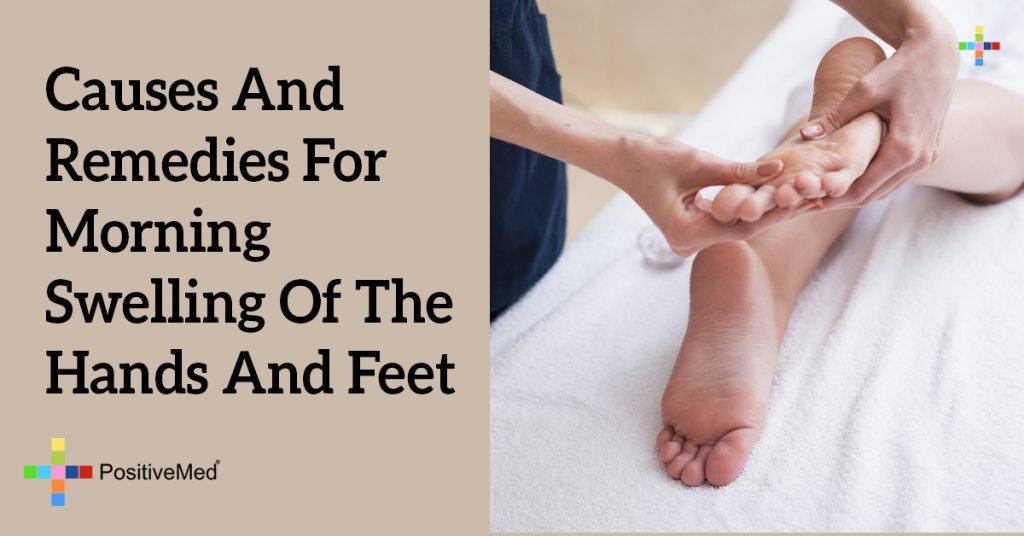
Causes and Remedies for Morning Swelling of the Hands and Feet
[nextpage title=”…”]
There are two basic ways to wake up in the morning: refreshed and rejuvenated, or groggy and in pain. If you fall into the latter group, you may dread waking up. Swollen hands and legs make mornings unpleasant, but they don’t have to; if you know what to look for and how to treat these problems, it’s entirely possible to start your day out just like everyone else.

The first step is identifying the root cause of swollen limbs. There are a variety of different reasons.
DehydrationThe first cause of swollen limbs is dehydration. Considering that a majority of the world fails to drink enough water during the day, many people are chronically dehydrated. This causes the body to go into ‘survival’ mode, where it retains water. This can cause swollen joints. Try drinking more water throughout the course of the day.
Sleeping PositionIf you sleep in a strange position, it can cause swelling of your hands and legs. This is often accompanied by sleep apnea or insomnia, making it difficult to get a full night’s rest. Consult a physician to address sleeping problems, and you may find the swelling goes away on its own. If you know you snore at night, this might be a sign of sleep apnea, which might need medical attention.
ArthritisIf you suffer from arthritis, swelling is normal. There are medications available that can address the issue and help alleviate the symptoms. This type of swelling is particularly located in the small joints of the hands and feet. Ask your doctor about good anti-arthritic medications you can take.
Kidney IssuesThose who have kidney infections may find swelling in their joints, hands, and legs, as the role of the kidneys is to rid the body of toxins. When you have a kidney infection, your organs do not work as effectively. Clearing up the infection can help. Kidney infections can be dangerous so see your doctor if you have symptoms of flank pain and pain on urination.
High Sodium DietAmerica is prone to eating a lot of food with far too much salt. Salt can cause water retention, causing a swelling in the hands and feet. Try reducing your daily sodium intake and see if the swelling goes down.
RELATED ARTICLE: If Your Body Is Swelling It Might Be a Sign of an Advanced Illness
PregnancyWomen in all stages of pregnancy may experience swelling as a result. Because pregnant women need to drink more water, it’s easier to become dehydrated.
[/nextpage] [nextpage title=”…”]
Follow your obstetrician’s instructions in regards to diet, and be careful of the medications you take while pregnant.
InjurySwelling in the hands and legs can come as a result of injuries. Those who spend most of their days at the computer may experience swelling in the hands due to overuse, as well as swelling in the legs from disuse. Make sure to take breaks throughout the day and walk around; exercising your legs is important in the prevention of deep vein thrombosis. In addition, allowing your hands a break every couple of hours can help offset the effects of carpal tunnel.
DiseaseThere are a variety of diseases that can cause swelling in various limbs, as well as a host of other symptoms. These number too many to list in the scope of this article; however, if you are experiencing strange symptoms that seem to have no obvious cause, consult a doctor.
Treatment of SwellingThere are a variety of ways to treat swollen limbs, but many methods involve medication. Those who want to take a more natural approach can try other means, such as:
Hot and Cold CompressesDepending on the cause of the swelling, a hot or cold compress can be used to bring down the inflammation. Allergic reactions can be treated with an ice pack, while an injury should be treated with heat after the initial period. Injuries need ice for the first twenty-four hours and heat after that.
MassageA gentle massage of the swollen area can help to push the swelling out. However, you should be careful not to cause further injury to the area. Keep the message gentle, with a rolling motion rather than applying hard pressure.
Mustard OilMustard oil can be used as a sort of massage oil for affected areas. Apply the oil and massage gently for around five minutes to help reduce the swelling. Do this in the morning as soon as you get up.
Compression MaterialsIf the swelling frequently happens at night, go to sleep while wearing compression leggings. These leggings will help to regulate blood flow and reduce swelling in your legs. You can also invest in compression gloves for your hands if they are affected, as well.
There are a number of natural remedies that can be used to address problems of swelling. Many of these may prove to be more effective than medication, particularly in the early stages of swelling.
[/nextpage]







